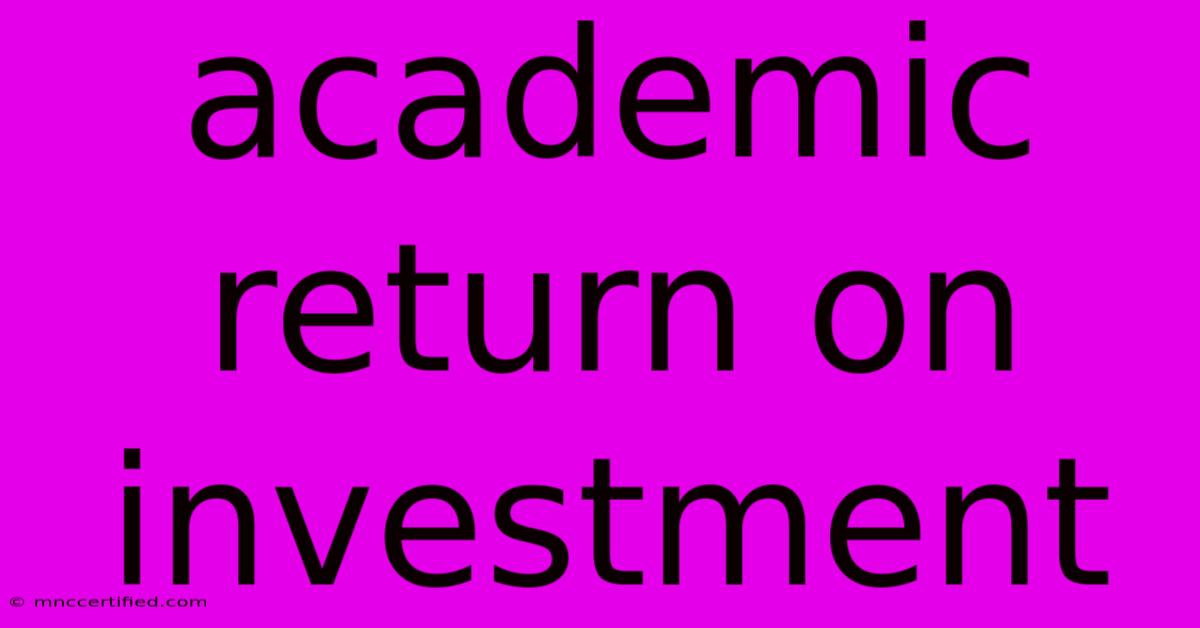Academic Return On Investment

Table of Contents
Academic Return on Investment: Is College Worth It?
The question, "Is college worth it?" is a perennial debate, especially considering the rising cost of tuition. To navigate this, understanding academic return on investment (ROI) is crucial. This article dives deep into the concept, examining factors influencing ROI and offering strategies for maximizing your return.
What is Academic Return on Investment (ROI)?
Academic ROI measures the financial benefits of a college education relative to its costs. It's not just about comparing salary increases to tuition fees; it's a more nuanced calculation considering:
- Tuition and fees: This includes direct costs like tuition, books, and supplies.
- Living expenses: Accommodation, food, transportation, and other living costs significantly impact the overall investment.
- Lost income: The opportunity cost of forgoing full-time employment during your studies is a considerable expense.
- Future earnings: The projected increase in earning potential throughout your career due to your education is the primary benefit considered.
- Other benefits: While harder to quantify, benefits like career advancement opportunities, improved job satisfaction, and enhanced personal development also contribute to the overall ROI.
Factors Influencing Academic ROI
Several factors significantly influence the academic ROI you experience:
1. Major and Career Path:
Choosing a high-demand major with strong career prospects directly impacts your ROI. STEM fields (Science, Technology, Engineering, and Mathematics) often boast higher starting salaries and career growth potential compared to some humanities majors. However, passion and aptitude should be balanced with career prospects. A fulfilling career in a lower-paying field might still offer a positive ROI in terms of overall life satisfaction.
2. University Prestige:
While not always a guaranteed indicator, attending a prestigious university can sometimes translate to better networking opportunities, higher starting salaries, and increased career advancement possibilities. However, the cost of tuition at these institutions needs careful consideration against the potential benefits.
3. Academic Performance:
Your GPA and overall academic record directly influence your job prospects. High achievers often secure better job offers and faster career progression.
4. Networking and Extracurricular Activities:
Engaging in extracurricular activities and building a strong professional network can significantly impact post-graduation success. Internships, volunteer work, and campus leadership roles enhance your resume and create valuable connections.
5. Debt Management:
Managing student loan debt is crucial for maximizing ROI. Borrowing responsibly and creating a repayment plan post-graduation are vital to avoid hindering your financial progress.
Maximizing Your Academic ROI: Practical Strategies
To optimize your academic ROI:
- Research potential career paths: Thoroughly investigate job market trends and salary expectations for various majors before committing to a degree program.
- Consider alternative educational paths: Explore community college, online learning, or vocational training programs as cost-effective alternatives for specific career paths.
- Prioritize financial aid and scholarships: Actively seek out financial aid opportunities to minimize your debt burden.
- Maintain a high GPA: Excellent academic performance is a key determinant of post-graduation success.
- Develop valuable skills: Focus on developing in-demand skills relevant to your chosen career path, such as coding, data analysis, or communication skills.
- Network strategically: Actively engage in networking events, career fairs, and internships to build professional relationships.
Conclusion: Is College Still Worth It?
The answer to whether college is worth it depends largely on individual circumstances and goals. By carefully analyzing your academic ROI, considering factors like major, university choice, and debt management, you can make an informed decision that aligns with your career aspirations and financial future. While the cost of higher education is substantial, a well-planned educational strategy can yield substantial returns, both financially and personally. Remember, the value of a college education often extends beyond simply earning potential; it includes personal growth, broadened perspectives, and access to a wider range of opportunities.

Thank you for visiting our website wich cover about Academic Return On Investment. We hope the information provided has been useful to you. Feel free to contact us if you have any questions or need further assistance. See you next time and dont miss to bookmark.
Featured Posts
-
Territory Codes For Insurance
Nov 29, 2024
-
Jay Slaters Mum Closes Go Fund Me Campaign
Nov 29, 2024
-
Savory Blueberry Jam Turkey Sandwich
Nov 29, 2024
-
Starbucks Thanksgiving Hours Florida Locations
Nov 29, 2024
-
Insurance Without Broker Fees
Nov 29, 2024